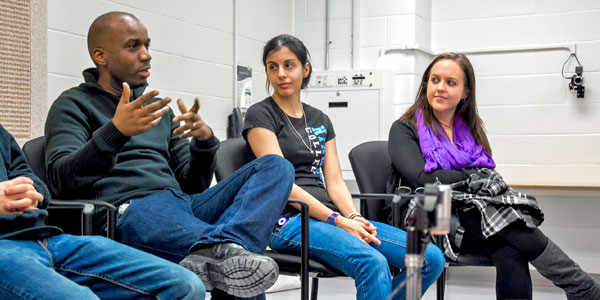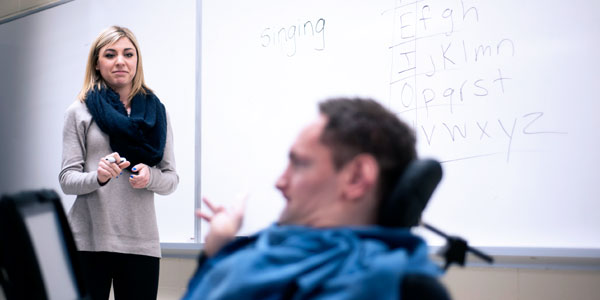- A significant number of field placements in child and youth work require students to be at least 19 years of age in order to assume a beginning level of professional responsibility. Those who are below 19 years of age could have their field placement options limited, which in turn could delay graduation.
- Persons who have benefited from child and youth work or related helping professions are often attracted to this field. Such persons can bring valuable experience to their professional careers. It is strongly recommended that a person complete at least one year of successful recovery and stabilization before registering in this program. This program should not be utilized as a component of a recovery process.
About this program
-
Credential Awarded: 3 Year Advanced Diploma
-
Campus: Welland
-
Code: 0169 P0169
-
Delivery Length: 6 Consecutive Terms (24 Months)
Who are you?
- I am a domestic applicant. *
- I am an international applicant.
Your education at Niagara College begins with your application. We're here to help make the process easy!
- Carefully read the Admission Requirements tab to make sure you meet the program requirements.
- Check the Availability tab to see whether or not the program is accepting applications, and what start dates are available.
- Complete an application online through ontariocolleges.ca.
- Our Admissions Office will acknowledge your application has been received and will provide you with your NC Student ID number and details on your next steps.
Sorry, international applications are not accepted for this program.
By Email
Reach out to us using our contact form and we'll respond within regular business hours.
Contact UsOne-on-One Session
Have questions about this program or NC? Speak with a friendly Student Recruiter!
Book a One-on-One SessionRequest Program Information
Want to receive more information about this program? Join our email list to receive program and event updates!
Sign Up NowOn-Campus Tours
Book a tour at the Welland or Niagara-on-the-Lake campus and explore our incredible learning and service spaces in-person!
Book an On-Campus TourVirtual Tours
Take a self-guided, virtual walking tour of our campuses and explore our labs and common spaces.
Take a Virtual TourVirtual Information Sessions
Join us for a virtual information session and explore the pathways and programs offered at NC!
Register for an Info SessionOverview
Are you passionate about making a difference in the lives of children and youth, and want to support their positive growth through complex life changes?
Through therapeutic programming and processes you will learn to engage purposefully and effectively to facilitate growth and positive life change in the development of healthy emotional, social, behavioural and developmental well-being.
NC Preferred Admission
This program grants preferred admission to qualified graduates from:
For detailed information, requirements and eligibility visit niagaracollege.ca/pathways/.
Courses
| Code | Course Name | Credits |
|---|---|---|
| CYCP1115 | Intro to Counselling Skills | 3 |
| CYCP1120 | Relational Practice I | 3 |
| CYCP1125 | Designing Therapeutic Programs | 3 |
| CYCP1130 | Group Work in CYC Practice | 3 |
| CYCP1134 | Placement Preparation | 3 |
| COMM1140 | Essential Communication Skills for Community Services | 3 |
| Code | Course Name | Credits |
|---|---|---|
| CYCP1220 | Relational Practice II | 3 |
| CYCP1225 | Facilitating Therapeutic Programs | 3 |
| PRAC1236 | Field Placement I | 3 |
| COMM1240 | Advanced Report Writing Strategies | 3 |
| SOCL1430 | Equity, Diversity and Inclusion in Canada | 3 |
| Elective Information | ||
|
Completion of additional General Education elective 1 course required |
||
| Code | Course Name | Credits |
|---|---|---|
| CYCP1310 | Communities, Systems and Social Innovation | 2 |
| CYCP1315 | At Risk Youth | 3 |
| CYCP1320 | Mental Health Supports | 3 |
| CYCP1325 | Legislation in CYC | 2 |
| PSYC1310 | Abnormal Psychology | 3 |
| Elective Information | ||
|
Completion of additional General Education elective 1 course required |
||
| Code | Course Name | Credits |
|---|---|---|
| PRAC1434 | Field Placement II - Child and Youth Care | 8 |
| CYCP1410 | Family Dynamics | 3 |
| CYCP1420 | Relational Intervention Strategies | 3 |
| CYCP1415 | Advanced Counselling Skills | 3 |
| PSYC1323 | Developmental Psychology | 3 |
| Code | Course Name | Credits |
|---|---|---|
| PSYC1322 | Adolescent Psychology | 3 |
| PSYC1531 | Human Intimacy | 2 |
| CYCP1510 | Responses to Trauma & Abuse | 3 |
| CYCP1515 | Drugs and Behaviour | 3 |
| CYCP1520 | Professional Practice I | 3 |
| CYCP1525 | Advocacy and Allyship | 3 |
| Code | Course Name | Credits |
|---|---|---|
| PRAC1634 | Field Placement III - Child and Youth Care | 10 |
| CYCP1620 | Professional Practice II | 3 |
Program Outcomes Term: 1244
Develop and maintain therapeutic relationships with children, youth and their families, respecting their unique life spaces, and applying the principles of relational practice to meet their needs.
Assess the strengths, developmental and holistic needs of children, youth and their families, using methods grounded in theoretical frameworks, research and therapeutic practices, to develop care and intervention plans.
Develop and implement care and intervention plans appropriate for the therapeutic milieu using evidence-informed practices and research to provide support for children, youth, and their families.
Use equitable and inclusive approaches that are anti-colonial, anti-oppressive, anti-racist, and strength-based frameworks, as well as cultural humility, to create positive and sustainable solutions and respond to inequities and to systemic barriers experienced by children, youth and their families.
Advocate for, and in solidarity with, children, youth, their families and communities through their participation in the development and implementation of care and intervention plans that uphold their rights.
Employ communication, collaboration and relational skills with the inter-professional team and with community partners to ensure and enhance the professionalism of practice.
Engage in self-inquiry, relational inquiry and critical reflection to develop strategies for learning and the practice of self-care, as a practitioner.
Use professional development resources and supervision to increase professional capacity, learning and leadership skills.
Adhere to relevant legislation and Child and Youth Care standards of practice, competencies, and codes of ethics as a practitioner.
Practice in a variety of contexts and settings, respecting needs for developmental growth, safety, wellbeing and agency, while addressing the varying age and developmental ranges of children, youth, and their families.
Employ crisis prevention and intervention techniques, and harm-reduction principles, with children, youth and their families in the provision of care, to ensure their safety, resolution of crises, and reparation of relationships.
Develop the capacity to work with children, youth and families who identify with Indigenous, Black, and racialized communities, as well as people in 2SLGBTQQIPAA and disabled communities, by identifying systemic inequities and barriers, integrating practices such as trauma-informed care, and respecting their inherent rights to self-determine.
Admission Requirements
Ontario Secondary School Diploma (OSSD), or equivalent including the following required course(s):
- English – any Grade 12 (C) or (U), or equivalent
Recommended Courses and/or Skills:
These courses and skills may help you succeed academically in this program, but they are not required for admission.
- Related volunteer and/or cooperative work experience
- Families in Canada – Grade 12 (C)
- Contemporary Indigenous Issues and Perspectives in a Global Context – Grade 12 (C) or (U)
- Canadian and World Issues – Grade 12 (U)
- Dynamics of Human Relationships – Grade 11 (O)
- Human Development Throughout the Lifespan – Grade 12 (C) or (U)
- Challenge and Change in Society – Grade 12 (U)
- Working with School-Age Children and Adolescents – Grade 12 (C)
Selection and Ranking
Applications are evaluated based on the published admission requirements. When the applicant provides proof of meeting the requirements, an offer of admission can be issued, provided space is available in the program.
Learn more about admission decisions.
Program Requirements
Communicable Disease Surveillance
- The confidential Communicable Disease Surveillance (CDS) Form must be completed and submitted to Student Health Services by week 8 of Term 1.
- Please view the CDS Form and Checklist for health requirements at niagaracollege.ca/cdsform/.
Criminal Record Check
- A Criminal Record Check with Vulnerable Sector Screening (CRC-VSS) which is less than 6 months old is required at the beginning of Term 2.
- Students with criminal charges for convictions will be significantly limited in placement, clinical, and/or employment opportunities in this field. The decision of whether a student with criminal charges or convictions is eligible to secure a field placement ultimately lies with the field placement agency.
- Field placements must be completed in order to graduate.
-
Students will be required to obtain a Vulnerable Sector Screening (VSS) in order to be cleared for placement/clinical. Please note, in order to obtain a Vulnerable Sector Screening (VSS), students must be 18 years of age or older. If a student is not 18 years of age or older at the start of this program, they will experience delays in progression through the program.
First Aid and CPR
- Current Standard First Aid certification and Cardiopulmonary Resuscitation (CPR) Level C certification is recommended.
-
Some placement sites require these certifications.
Transportation
- Students are responsible for their own transportation in order to complete program requirements which may not be readily accessible by public transportation.
-
Program requirements could include co-ops, placements, volunteer requirements, practical labs, field projects, assignments, clinicals, or any other off-campus visits required as part of the program’s curriculum.
- Students require access to a private vehicle to facilitate program requirements.
Computer/Technology Requirements
Students are responsible for ensuring that they have a Microsoft Windows 10 based desktop or laptop system that meets or exceeds the following general personal computer technology requirements:
- A desktop or laptop system running on an updated Microsoft Windows 10 operating system.
- Minimum 256GB SSD storage and 8 GB memory.
- An integrated or peripheral video camera, microphone and speaker system.
- Reliable internet connectivity with Broadband capabilities (a minimum download speed of 5 Mbps) is recommended.
Niagara College will not be able to provide support for systems different than the above specifications. Any provided software may not operate properly. Academic software for your courses (supported under the Microsoft Windows 10 operating system) will be made available for download and remote use. Access will also be provided to remote high performance computer labs if software downloads are not feasible.
Note: There is no support for Chromebooks or Apple products for this program. (learn more)
The technology requirements indicate there is no support for Chromebooks or Apple products. Can I still take my program if I have a Macbook or Chromebook?
For most programs, the recommendation is to have a MS Windows 10 computer (as outlined in the "Computer/Technology Requirements" section on this page) for an optimal experience and for ease of downloading academic software. The reliability of remote connections to college computers and software cannot be guaranteed for Macbook and Chromebook users.
The Microsoft Office suite products that are available free to Niagara College students though Office 365 do have versions that work with Macbooks and Chromebooks, and the majority of internet-based applications will work as well. However, some program-specific software is designed to run on Windows 10, and the successful download of these applications cannot be guaranteed. Our Learning Management System (LMS) at Niagara College is Blackboard, and while students can access Blackboard through an internet browser, for some assignments and tests there is a layer of security that uses a proctored browser. The proctored browser will not function on Macbooks nor Chromebooks.
Students assume the risk of a compromised virtual experience if they choose to participate without the recommended technology.
Computer/technology requirements may be subject to change without notice.
All costs associated with program requirements are the responsibility of the student.
Back to TopAvailability
Domestic Applicants Apply
Legendfor intake status table
Open
Accepting applications
Waitlisted
Eligible applications will be placed on a waiting list
Closed
Not accepting applications
Suspended
No longer offered this term
International Applicants
Sorry, international applications are not accepted for this program.
Pathways
Explore your pathway options What are pathways? for the Child and Youth Care program below.
-
From NC toGriffith University — Bachelor of Child and Family Studies Australia
-
From NC toGriffith University — Bachelor of Human Services Australia
-
From NC toNiagara University — Bachelor of Arts in Psychology United States
-
From NC toNiagara University — Bachelor of Science in Psychology United States
-
From NC toRoyal Roads University — Bachelor of Arts in Justice Studies Canada
-
From NC toSeneca College — Honours Bachelor of Child Development Canada
-
From NC toSeneca College — Honours Bachelor of Mental Health and Addiction Canada
-
From NC toThompson Rivers University — Bachelor of General Studies Canada
-
From NC toThompson Rivers University — Bachelor of Health Science Canada
-
NC PathwayThis program grants Preferred Admission to qualified graduates of:Niagara College — Pre-Community Services
For detailed information about these pathway options visit niagaracollege.ca/pathways/.
Applicants with previous postsecondary education will be assessed for transfer credits upon receipt of an official transcript from their previous institution. There is no fee for this service.
Tuition
The below is a tuition fees estimate ( what's this?) for the indicated start term. Tuition fees are set in accordance with the Ontario Ministry of Training, Colleges and Universities fee guidelines.
Year 1
Level one $2,652.44
| Fee Type | Fee Cost |
|
Tuition
|
$1,357.49
|
|
Ancillary Fees
|
$1,179.95
|
|
Material Fees
|
$115.00
|
|
Level one Total
|
$2,652.44
|
Level two $2,183.00
| Fee Type | Fee Cost |
|
Tuition
|
$1,357.49
|
|
Ancillary Fees
|
$756.95
|
|
Material Fees
|
$68.56
|
|
Level two Total
|
$2,183.00
|
Level three $2,074.44
| Fee Type | Fee Cost |
|
Tuition
|
$1,357.49
|
|
Ancillary Fees
|
$716.95
|
|
Material Fees
|
$0.00
|
|
Level three Total
|
$2,074.44
|
Year 2
Level four $2,394.44
| Fee Type | Fee Cost |
|
Tuition
|
$1,357.49
|
|
Ancillary Fees
|
$1,036.95
|
|
Material Fees
|
$0.00
|
|
Level four Total
|
$2,394.44
|
Level five $2,074.44
| Fee Type | Fee Cost |
|
Tuition
|
$1,357.49
|
|
Ancillary Fees
|
$716.95
|
|
Material Fees
|
$0.00
|
|
Level five Total
|
$2,074.44
|
Level six $2,074.44
| Fee Type | Fee Cost |
|
Tuition
|
$1,357.49
|
|
Ancillary Fees
|
$716.95
|
|
Material Fees
|
$0.00
|
|
Level six Total
|
$2,074.44
|
We're helping make your NC dreams a reality.
To help fund your education access $1.5 million in scholarships and awards made available by our generous donors. You will be automatically considered for some awards, however other awards will require an application.
Explore Scholarships & BursariesAdvanced Tuition Tool
The tuition amounts provided are an estimate only ( what's this? ).
To generate a detailed fees calculation, which includes tuition, ancillary, and material fees for this or a different start term, please access the Advanced Tuition Tool.
Generate My FeesSorry, international applications are not accepted for this program.
What is your tuition estimate?
Your tuition estimation includes tuition, ancillary, and material fees based on a program and term. Fees may vary upon enrolment into specific courses that are outside of the core curriculum or elective courses. Fees for future terms (where fees have yet to be published) are estimates based on the current academic year fee structure.
Additional fees include textbooks and a parking pass (if parking on campus). Additional costs may be incurred for optional field trips, learning materials, equipment or clothing. All costs associated with program requirements are the responsibility of the student.
Note: For new programs tuition and fees may not yet be available. Typically tuition amounts are available in May for the next academic year. Please check back.



